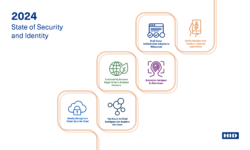Almost Half of Enterprises Ill-Equipped to Safeguard IoT Devices: Survey
A study conducted by the Ponemon Institute explores the increasing risk around connected IoT, cryptography-related security incidents and more.

CLEVELAND — Results from a newly released survey show that 60% of enterprises have little ability to detect and respond to public key infrastructure (PKI) degradation or breaches.
Keyfactor, a provider of secure digital identity management solutions, and Ponemon Institute released the 2020 edition of “The Impact of Unsecured Digital Identities,” a benchmark report exploring enterprises’ ability to manage increasing numbers of cryptographic keys and digital certificates securing network connections.
“Connectivity and the number of digital identities within the enterprise has grown exponentially thanks to continued Cloud, mobile, DevOps and IoT adoption,” says Keyfactor CSO Chris Hickman. “The complexity of managing those identities while keeping them securely connected to the business has created a critical trust gap – in many cases the keys and certificates designed to build trust are instead causing outages and security breaches.”
Digital certificates and keys ensure authenticity across enterprise user, application and device identities. Cryptographic algorithms encrypt the data associated with those identities, providing secure communication and exploit protection.
Two-thirds of respondents say their organization is adding additional layers of encryption to comply with industry regulations and IT policies; however, shorter certificate validity has doubled the management workload on short-staffed IT and security teams.
Additional key findings:
- Connected IoT increasing risk: 60% say they’re adding additional layers of encryption technologies to secure IoT devices, but 46% admit low ability to maintain IoT device identities and cryptography over device lifetime.
- A rise in security incidents: on average, organizations have experienced a Certificate Authority (CA) or rogue man-in-the-middle (MITM) and/or phishing attack five times in the last 24 months, with a 40% likelihood of a MITM or phishing attack over the next 24 months; 73% of respondents admitted that digital certificates have and continue to cause unplanned downtime and outages.
- Staffing shortages: on average, 16% of the IT security budget is spent on PKI deployment annually, yet just 38% of respondents say their organization has enough IT security staff members dedicated to PKI deployment.
- Cryptography related security incidents undermine trust: 76% of respondents say failure to secure keys and certificates undermines the trust their organization relies upon to operate.
- Cryptography lacks a center of excellence: Despite the rising cost of PKI and growth of cryptography-related incidents, just 60% of companies have the ability to drive enterprise-wide best practices.
“Our 2019 report was a wake-up call in many ways. It was the first report of its kind to investigate the role that digital certificates and keys play in creating trust inside and outside organizations,” says Dr. Larry Ponemon, founder of the Ponemon Institute.
The institute conducts independent research and verifies the privacy and data protection practices of organizations in a variety of industries.
“In many ways I was optimistic that we’d see progress this year as more executives invested the resources needed to close the gap between ‘standard practice’ in PKI and ‘best practice’,” Ponemon continues. “This year’s report shows that while progress has been made in a few areas, that gap is actually growing wider.”
Hickman says the report reinforces cryptography’s importance within the security agenda. “In many cases, PKI remains a manual function with ownership split across IT and security teams,” he continues. “Growing connectivity has created an exposure epidemic. Without a clear PKI in-house or outsourced program owner and process to close critical trust gaps, the risk of outages and breaches will continue to rise.”
The study was conducted by Ponemon Institute on behalf of Keyfactor and included responses from 603 IT and information security executives and practitioners in the United States and Canada across 14 industries, including financial services, healthcare, manufacturing, retail and automotive.
If you enjoyed this article and want to receive more valuable industry content like this, click here to sign up for our FREE digital newsletters!

Security Is Our Business, Too
For professionals who recommend, buy and install all types of electronic security equipment, a free subscription to Commercial Integrator + Security Sales & Integration is like having a consultant on call. You’ll find an ideal balance of technology and business coverage, with installation tips and techniques for products and updates on how to add to your bottom line.
A FREE subscription to the top resource for security and integration industry will prove to be invaluable.







